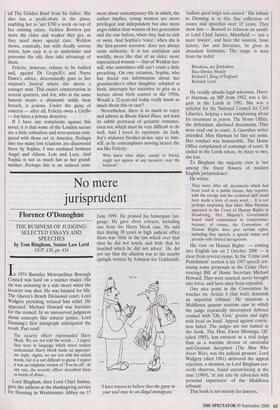No mere jurisprudent
Florence O'Donoghue
THE BUSINESS OF JUDGING: SELECTED ESSAYS AND SPEECHES by Tom Bingham, Senior Law Lord OUP, £30, pp. 434 In 1974 Barnsley Metropolitan Borough Council was hard on a market trader. His sin was urinating in a side street when the lavatory was shut. He was banned for life. The Queen's Bench Divisional court, Lord Widgery presiding, refused him relief. He appealed. Michael Howard was barrister for the council. In an unreserved judgment about concepts like natural justice, Lord Denning's first paragraph anticipated the result, Part read:
The security officer reprimanded Harry Hook. We are not told the words ... I expect they were in language which street traders understand. Harry Hook made an appropri- ate reply. Again, we are not told the actual words, but it is not difficult to guess. I expect it was an emphatic version of 'You be off.' At any rate, the security officer described them as words of abuse...
Lord Bingham, then Lord Chief Justice, gave the address at the thanksgiving service for Denning in Westminster Abbey on 17 June 1999. He praised his homespun lan- guage. He gave short extracts, including one from the Harry Hook case. He said that during 38 years in high judicial office there was 'little in the law which over that time he did not touch, and little that he touched which he did not adorn'. He did not say that the allusion was to the nearby epitaph written by Johnson for Goldsmith: `I have reason to believe that the gypsy in your soul may be an illegal immigrant.' nullum quod tetigit non ornavit.' His tribute to Denning is in this fine collection of essays and speeches over 15 years. They show him — Boswell to Johnson on anoth- er Lord Chief Justice, Mansfield — 'not a mere lawyer', and here the sources, from history, law and literature, he gives in abundant footnotes. The range is seen from the index:
Rhodesia, see Zimbabwe Rice-Davies, Mandy Richard I, King of England Richard, Lord
He readily attacks legal solecisms. Harri- et Hannan, an MP from 1982, was a liti- gant in the Lords in 1981. She was a solicitor for the National Council for Civil Liberties, helping a man complaining about his treatment in prison. The Home Office, the defendant, disclosed documents. They were read out in court. A Guardian writer attended. Miss Harman let him see some. Her conduct was honourable. The Home Office complained of contempt of court. It ended in the Lords where, by three to two, she lost.
To Bingham the majority view is 'not among the finest flowers of modern English jurisprudence'.
He writes:
They were, after all, documents which had been read in a public forum. Any reporter with the energy and the technical skill could have made a note of every word.... It is not perhaps surprising that when Miss Harman appealed to the Court of Human Rights in Strasbourg, Her Majesty's Government found itself constrained to compromise: because, of course, the Convention of Human Rights does give certain rights, including free speech, a special status and permits only limited derogations.
His view on Human Rights — coming into English law on 2 October 2000 — is clear from several essays. In the 'Crime and Punishment' section is his 1997 speech crit- icising some proposals in the Crime (Sen- tencing) Bill of Home Secretary Michael Howard. They were enacted, never brought into force, and have since been repealed.
One nice point in the Convention he touches on. Article 6 (fair trial) demands an impartial tribunal. He mentions a Middlesex quarter sessions case in which the judge repeatedly interrupted defence counsel with 'Oh, God,' groans and sighs with head on hand. Appeal against convic- tion failed. The judges are not named in the book. The Hon. Ewen Montagu, QC (died 1985), less eminent as a trial judge than as a wartime deviser of successful anti-German deception (The Man Who Never Was), was the judicial groaner. Lord Widgery (died 1981) delivered the appeal rejection, a decision, as Lord Bingham cor- rectly observes, found unconvincing at the time (1969), 'at any rate by advocates with personal experience' of the Middlesex tribunal.
This book is not merely for lawyers.


























































































 Previous page
Previous page